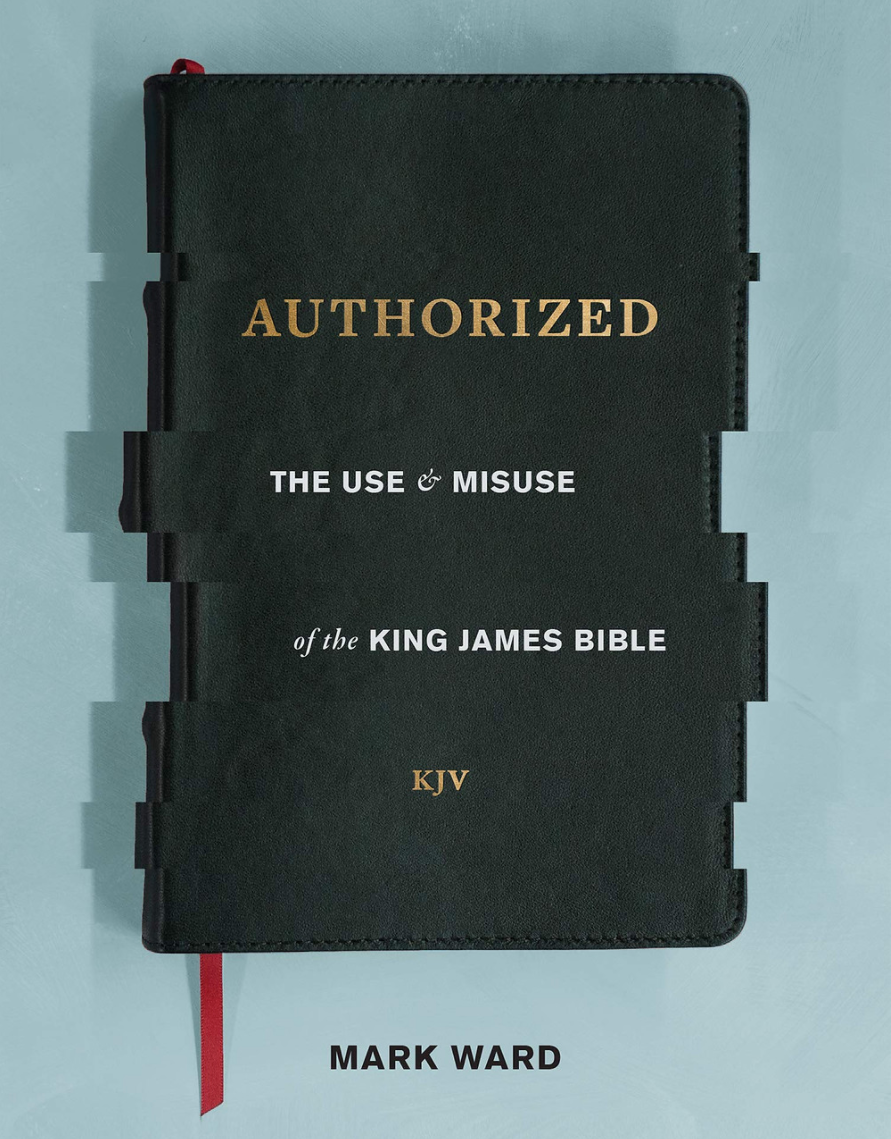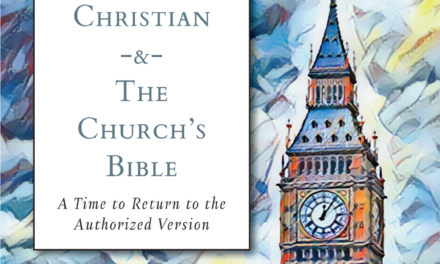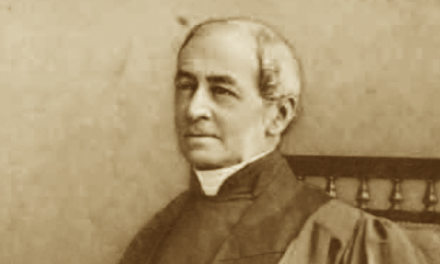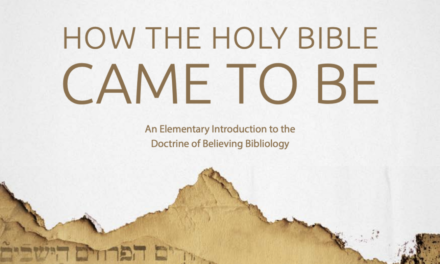Mark Ward
“Authorized: The Use & Misuse of the KJV"
Reviewed by Taylor DeSoto
An Admission:
Doctrine is Affected

Introduction
In this review of Authorized: The Use & Misuse of the King James Bible, I want to demonstrate a critical error in Ward’s thinking as it pertains to the use of multiple translations. Ward claims that there are no major doctrines affected between the KJV and modern translations.
“No major doctrines are affected. But I want to get the little stuff and the big stuff when I read God’s word, and I think you do too.”
119
Despite saying this, he goes on to say that there are translational differences between modern versions that are “decidedly different.”
“I agree with a commenter on one of my blog posts: “I highly recommend changing versions once in a while. Nothing catches your attention more than seeing a verse you have known for a long time, and it’s translated decidedly different in your new version. There is some material for a study project.… God’s Word is awesome!””
135
In this article, I want to look at what exactly it means to be giddy about translations being “decidedly different” as well as how “bible” is being defined here.
Decidedly Different
What does it mean for a word or passage to be “decidedly different?” It’s difficult to say if different simply means a different word, or if different means that the word is divergent in definition from the other word. It seems Ward is employing this quotation from his friend to mean the latter due to the fact that a “study project” would not be warranted for the former definition. If Ward was simply talking synonyms, his reader may need a dictionary, and that’s about it.
Let’s take Luke 14:2 for example. In the KJV and ESV, the word ὑδρωπικός is translated “dropsy,” commonly called edema today. The NIV translates the same word as “abnormal swelling of his body.” In the same passage, the KJV and ESV translate the word νομικοὺς as “lawyers” where the NIV translates it as “experts in the law.” While the NIV is unfortunately less precise here, it is easy to understand why the translation team chose those words. The five minutes it took me to reference the underlying Greek and three translations was far from what I would consider a “study project.”
So let’s take Ward’s words at face value here and find a word that actually requires a “study project.” In John 1:18, both the TR and the NA28 have the word μονογενής. The KJV translates the word “only begotten” and the ESV has “only.” The NIV translates it “one and only” and the NASB 1995 has “only begotten.” The NASB 2020 will translate it “only” and “only begotten” simultaneously. The word μονογενής is a word that contains two words, μόνος (only) and γένος (descendant). In the ESV and NIV, the translators decide to only translate the word μόνος. In Koine greek, γένος is employed to pertain to generation. Here are some examples:
Ἀγεννής – Low born
Εὐγενής – High born
Ὁμογενής – of the same race or family
Παλιγενής – Born again
Προγενής – born before
Προωτογενής – first born
In no case that I could find does γένος go untranslated or serve as an equivalent to μόνος. In this case, I would say that this qualifies as “decidedly different.” If it is true that Christ is the “only son of God,” what do we do with John 1:12?
“But as many as received him, to them gave he power to become the sons of God, even to them that believe on his name”
Christ is not the “only” son, or “unique” son, he is the only begotten son. The whole doctrine of adoption becomes completely void if the γένος goes untranslated as we see in the NIV. Further, the textual variant in this passage which is selected in modern translations adds more doctrinal confusion to the matter at hand. In the ESV it reads, “No one has ever seen God; the only God, who is at the Father’s side.” It translates μονογενής Θεός (only begotten God) as “the only God.” So, who is this God, that is at the Father’s side? Is the Father not God?
If we do as Ward says, and conduct a “study project,” we find the reading μονογενής Θεός in the 2nd century gnostic work Excerpts from Theodorus. Dean Burgon notes that the first time that this reading of John 1:18 is quoted in extant literature is in reference to the gnostic arch-heretic, Valentinus. Regardless of the progeny of this textual variant, the translation “only” and “only begotten” are “decidedly different,” and the outcome is two entirely different meanings. The passage becomes infinitely more complicated when “son” is exchanged for “god.”
What is “the Bible”?
If it is the case that both of these translations are “the Bible,” then what exactly is “the Bible?” Since the claim has been made by Ward and his peers that “no doctrine is affected,” between the two most different manuscripts, this is an important question to answer. See this statement from The King James Only Controversy.
“The reality is that the amount of variation between the two most extremely different New Testament manuscripts would not fundamentally alter the message of the Scriptures!”
67
Yet we have seen with one textual variant, and one translational difference, that there are indeed important differences that matter. If the claim is made that these differences do not matter, and that doctrine is not affected, then the definition of “the Bible” being employed by Ward and his peers is not based on the idea that one Bible has been transmitted down from the prophets and apostles. It assumes as its premise that multiple bibles have come down the line, and collectively, all of those different articulations are “the Bible.” James White confirms this in his book.
“In fact, they demonstrated a consistent transmission of a single body of material over time.”
80
Take this line of thinking to its logical end, and we must conclude that even destroyed manuscripts are a part of this “bible,” because all of our extant manuscripts came from other manuscripts, most of which are destroyed or lost to time. So “the Bible” is not a tangible thing if we assume the conclusions of the scholarly guild. It is a collection of things, which we have evidence of, that bear witness to the tangible thing that no longer exists. The differences in this “consistent transmission” of the whole “manuscript tradition” are simply the result of the scribal process, and the differences “do not affect doctrine.”
The “manuscript tradition” is really just a testimony to the Word of God (autographs), and when viewed at a level of extant evidence, must be viewed as “the Bible” in order to maintain some semblance to the protestant doctrine of Scripture. In other words, “the Bible” is the “manuscript tradition.,” and we don’t have the whole manuscript tradition. That is why the scholarly guild has taken up the position that “we have enough” of the Bible (Dirk Jongkind & Co.), even though we do not have “exactly what the prophets and apostles wrote” (Dan Wallace). It does not matter what the prophets and apostles wrote, because “the Bible” gives us “good access” to what was originally written. In other words, “the Bible” simply bears witness to the Word of God as it existed originally.
When we examine the above doctrine against the Chicago Statement, we find that this idea of the “manuscript tradition” being “the Bible” perfectly comports with inerrancy.
“We affirm that inspiration, strictly speaking, applies only to the autographic text of Scripture, which in the providence of God can be ascertained from available manuscripts with great accuracy…We deny that any essential element of the Christian faith is affected by the absence of the autographs. We further deny that this absence renders the assertion of Biblical Inerrancy invalid or irrelevant.”
Chicago Statement on Biblical Inerrancy, Article X
In order for this to not render inerrancy “invalid or irrelevant,” the above definition of “the Bible” must be adopted. “The Bible” is not exactly what the prophets and apostles wrote, it bears witness to what the prophets and apostles wrote, and according to the scholarly guild, we “have a good amount of access” to that object, but not perfect access. Therefore, “the Bible” as defined by Ward and his peers is not what the prophets and apostles wrote, just an echo of what they wrote. Those echoes, the manuscripts, form “the Bible,” which Christians have “good access” to through translation. The Chicago Statement did not defend against higher criticism, it made a way for it to enter into the church.
Conclusion
If the scholarly guild is correct, then what is being set forth is extremely problematic. It means that Jesus Christ is both the “only God,” distinct from the Father, and also that he is the “only begotten son” of the Father. If we compare these two theological statements, then Jesus Christ is uniquely God, and was begotten of the Father, who is not uniquely God. Both of these are in “the Bible.”
Ward is excited about this. In fact, according to him, “This is awesome!” It is awesome, apparently, that in order to maintain Trintiarian orthodoxy and the doctrine of adoption, we now have to explain the following:
1. Jesus Christ is the only God (ESV, NASB)
2. The only God is at the Father’s side (ESV)
3. The only God is in the Father’s bosom (NASB)
4. Jesus Christ is the only begotten Son (KJV)
5. Jesus Christ is the one and only Son (NIV)
6. Those who believe on Christ become the sons of God (KJV)
In summary, “the Bible” teaches that Jesus Christ is uniquely God, yet he was revealed by the Father, who is not uniquely God. It teaches that Jesus Christ is the only son of God, and yet all that believe are also the sons of God. Yes, this is truly “awesome!” It should not surprise anybody that this kind of thinking allows post-Barthian and higher critical scholars to heavily influence the field of textual scholarship.
The prominent textual scholars recognize that this doctrine does not comport with one Christian faith, it comports with different Christian faith communities. The only people who do not seem to recognize this problem are the evangelical textual scholars who will go down on the “no doctrine is affected” ship. Yet, if “no doctrine is affected,” then the liberal scholars are correct. As Jennifer Knust and DC Parker believe, there is no “Bible”, just bibles. There is no “Christianity,” there are Christianities. You can believe that Jesus Christ is both the only begotten Son and also “the unique God” and still be a modern protestant Christian.
Since it seems to be the case that “decidedly different” doesn’t just mean “synonym,” the conclusion of Ward’s argument is actually that yes, doctrine is affected. If translations use words that are distinct enough to mean something different, then it seems the only conclusion to Ward’s argument is that doctrine can, and is impacted by translational differences. I believe that I have shown that this is the case in my article.




